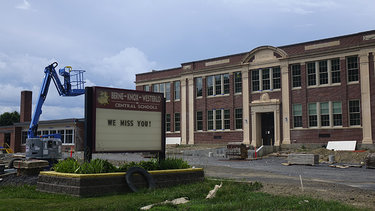BKW submits its reopening plan
The Enterprise — Noah Zweifel
Berne-Knox-Westerlo’s sign expresses nostalgia for school days before the coronavirus forced the state to require remote learning in March, with the possibility of it continuing into the 2020-21 school year. The state requires school districts to have a reopening plan, which BKW submitted on July 28. Governor Andrew Cuomo will make his determination about schools reopening the first week of August.
HILLTOWNS — The Berne-Knox-Westerlo Central School District submitted its reopening plan to the state on July 28, and will find out, along with every other district in the state, between Aug. 1 and Aug. 7, whether schools will reopen this fall.
The district’s plan broadly adheres to guidelines laid out by the Centers for Disease Control and Prevention, the New York State Education Department, and the New York State Department of Health. The full plan can be found on the district’s website.
If schools are allowed to reopen in the fall, BKW students and faculty will be required to wear masks in all common areas, but the masks can be removed during classes, meals, and designated break periods. Students and faculty who cannot wear masks for physical and/or mental health reasons will be exempt, but will be expected to maintain a distance of six feet from others at all times.
The school will be marked with six-foot measurements to guide social distancing. During physical education, a distance of 12 feet is required.
The building itself will have an updated filtration system.
Each day, students and staff will fill out an online health screening to determine whether or not they are eligible to be around others in the building. Anyone who fails the screening will be required to stay home until the screening can be passed.
Universal screenings are not recommended by the CDC, but are required by the state’s Department of Health.
COVID-19 symptom-isolation areas and treatment areas are to be determined for both the elementary and secondary school.
In the district’s plan, parents are encouraged to transport their kids to school whenever they can, but buses will still be available, albeit with assigned seating and new schedules that stagger arrival and departure to ensure social distancing and contract tracing.
For families concerned about exposure for any reason, the school will retain its remote learning programs, but a request must be submitted to the school by Aug. 14.
The plan suggests that the district will take attendance in its usual way, registering both remote and local students daily.
“It is critical for schools to use a variety of creative methods to reach out to students and their families who have not engaged in distance learning,” the State Education Department says in its own guidelines.
Meals for students will be provided both locally and remotely, with on-site elementary students receiving their meals — ordered all at once at the beginning of each week — in classrooms at the designated times. High school students will use a cafeteria; the system has been altered to reduce contact as much as possible.
Remote learners can have meals delivered in the same manner they were after the school buildings shut down earlier this year.
The school’s before- and- after- care programs remain.



